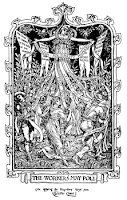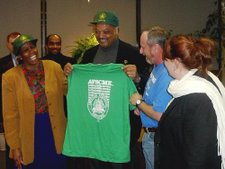
May 1, 1886, became historic. On that day thousands of workers in the larger industrial cities poured into the streets, demanding eight hours. About 340,000 took part in demonstrations in Chicago, Milwaukee, Detroit, Cincinnati, St. Louis, Baltimore, Washington, New York, Philadelphia, Boston and other places. Of these nearly 200,000 actually went out on strike. About 42,000 won the eight-hour day. Another 150,000 got a shorter day than they had had before.
Chicago workers supported the movement most vigorously. To combat labor organization and activity, Chicago employers organized and acted. Pinkerton detectives and special deputies were in evidence. Policemen were swinging billies and breading up knots of workers on street corners.
At the factory gates of McCormick Harvester Co., where a strike meeting was being held on May 3, policemen swung their clubs and then fired into the running strikers....The speaker at the meeting was August Spies, a member of the Central Labor Union, which had supported the May First strike. He was also a member of a militant labor group that was at the time influential in the Chicago Labor movement. Six workers were killed that day and many wounded.
Anger ran high through the Chicago labor movement. About 3,000 attended a protest meeting the next day at Haymarket Square....The Chicago press reported the speeches were less "inflammatory" than usual. Mayor Carter H. Harrison who was present testified later that the meeting was "peaceable." But as it was about to adjourn, policement swooped down and ordered the audience to disperse. Then some unknown person threw a bomb. It exploded, killing a police sergeant and knocking several core to the ground. The police opened fire. At the end of the day, seven policemen and four workers lay dead.
At once several Chicago labor leaders were rounded up and thrown in jail. Eight of these finally came to trial--Albert Parsons, August Spies, Louis Lingg, George Engel, Michael Schwab, Samuel Fieldon, Adolph Fischer and Oscar Neebe. The presiding judge helped pick the jury which was strongly anti-labor and hostile to the defendants. The trial lasted 63 days. All of the men were declared guilty of murder. All were given death sentences, except Neebe who got a 15-year prison sentence.
A nationwide defense campaign won wide popular favor...At the last moment, as a result of widespread protests, the Governor of Illinois communted to life imprisonment the sentences of Fieldon and Schwab. It was reported that Lingg "committed suicide" in his cell.
On November 11, Albert Parsons, August Spies, Adolph Fischer and George Engel were hanged. On the gallows Spies cried, "There will be a time when our silence will be more powerful than the voices you strangle today." Straightway the defense movement, now led by Albert Parsons' widow, Lucy Parsons, turned to efforts to have the remaining three men freed. Fieldon, Schwab and Neebe were finally pardoned by Governor Altgeld in 1893. He was fully convinced, he said, of the innocence of all the eight men.
Out of the eight-hour struggle which culminated in the strike of May 1, 1886, and its aftermath, the Haymarket tragedy, came international May Day. In Paris, France, on July 14, 1889, leaders from organized proletarian movements in many countries came together to form once more an international association of workers....At the first congress of the Second International, delegates listened to the story related by the United States representatives, considered a request from the American Federation of Labor for support of their eight-hour fight, and voted to make May 1, 1890, a day for an international eight-hour day demonstration.






1 comment:
Hey! I'm an organizer with UNITEHERE on the Hotel Workers Rising campaign in Indianapolis, IN. Indianapolis hotel workers are engaged in a struggle of historic proportions. There are currently no union hotels in America's 12th largest city, yet huge majorities of workers at the Sheraton, Westin, and Hyatt Regency hotels have demanded a card-check neutrality agreement. They have yet to hear back from the hotel owners. Work conditions in Indianapolis hotels are really tough. Housekeepers routinely clean up to 30 rooms per day and make just $7.25/hr. We've just put together an inspirational video documenting this 2-year struggle. It would be great if you could put it up on your blog for people to watch. Thank you,
http://www.youtube.com/watch?v=exBtVnZaWUk
Post a Comment